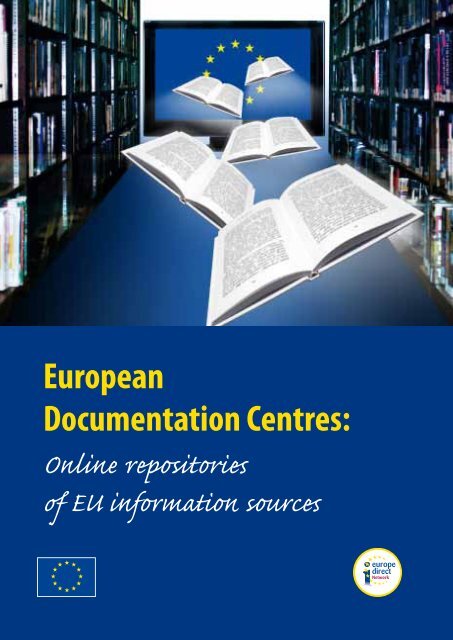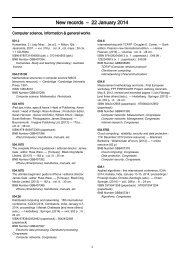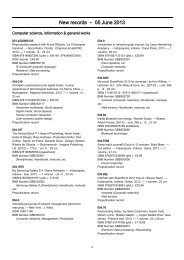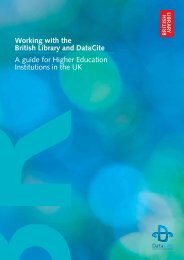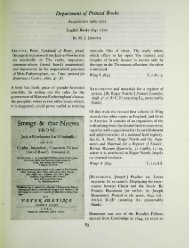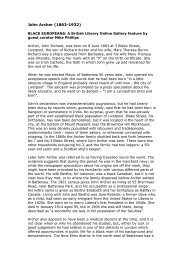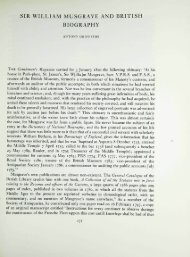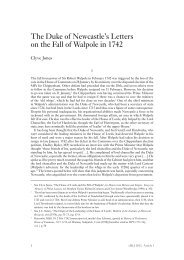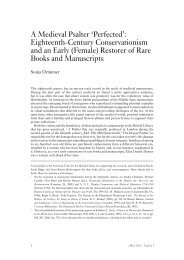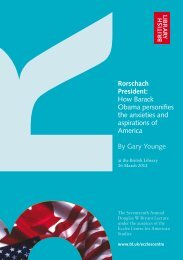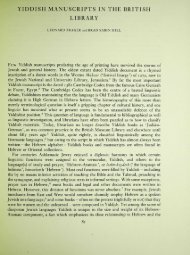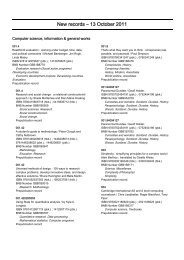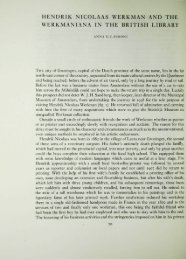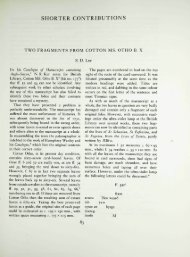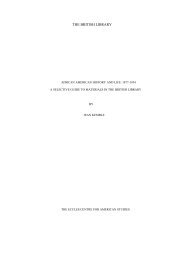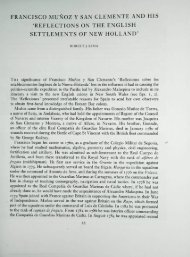online repositories of EU information
online repositories of EU information
online repositories of EU information
Create successful ePaper yourself
Turn your PDF publications into a flip-book with our unique Google optimized e-Paper software.
Online <strong>repositories</strong> <strong>of</strong> Eu <strong>information</strong>s sources<br />
European<br />
Documentation Centres:<br />
Online <strong>repositories</strong><br />
<strong>of</strong> <strong>EU</strong> <strong>information</strong> sources<br />
1
Online <strong>repositories</strong> <strong>of</strong> Eu <strong>information</strong>s sources<br />
Contents<br />
Contents ...................................................................................1<br />
Introduction .............................................................................3<br />
Survey on European electronic <strong>repositories</strong> ...........................4<br />
Work programme 2010-11 ......................................................5<br />
Pr<strong>of</strong>ile <strong>of</strong> EDZ ArchiDok ...........................................................6<br />
Pr<strong>of</strong>ile <strong>of</strong> European Sources Online(ESO) ..............................10<br />
Pr<strong>of</strong>ile <strong>of</strong> Ketlib ......................................................................14<br />
Pr<strong>of</strong>ile <strong>of</strong> the Portuguese European Gateway .......................18<br />
1
Online <strong>repositories</strong> <strong>of</strong> Eu <strong>information</strong>s sources<br />
Introduction<br />
Aim <strong>of</strong> the catalogue<br />
This brief e-catalogue has been produced to present four European electronic<br />
<strong>repositories</strong> which have been created by the EDC network members. Each repository<br />
is presented in a factsheet to help familiarise the reader with its contents, its<br />
founder(s) and the contributing EDC members. The factsheets also look at further<br />
(future) developments <strong>of</strong> the <strong>repositories</strong>, which is an important area currently<br />
under investigation by the newly created Pan-European Working Group (PEWG) on<br />
European <strong>repositories</strong>.<br />
Rationale and work <strong>of</strong> the PEWG<br />
The Pan-European Working Group on European <strong>repositories</strong> was created in 2010.<br />
A group <strong>of</strong> 17 experts from EDCs have been selected on the basis <strong>of</strong> the quality<br />
<strong>of</strong> their proposals and their expertise in European <strong>repositories</strong>, following a call for<br />
expression <strong>of</strong> interest which was opened to all EDCs.<br />
The PEWG on European <strong>repositories</strong> has a three-fold mission:<br />
• The creation <strong>of</strong> a knowledge base using a bottom-up approach to identify and<br />
evaluate the experiences and multiple sources <strong>of</strong> expertise available within the<br />
Europe Direct Network;<br />
• The creation and presentation <strong>of</strong> knowledge in tangible outputs to enable all<br />
Europe Direct Network members to benefit from this knowledge;<br />
• The creation <strong>of</strong> ‘pools <strong>of</strong> expertise’ within the Europe Direct Network, with<br />
the support <strong>of</strong> PEWG members who could act as ‘contact points’ for further<br />
assistance to fellow Network members.<br />
3
Survey on European<br />
electronic <strong>repositories</strong><br />
One <strong>of</strong> the PEWG’s first missions involved the identification and analysis <strong>of</strong> existing<br />
projects regarding European <strong>repositories</strong> within the EDC network, followed up with a<br />
report on its findings. For this purpose, a survey was carried out in October/November<br />
2010 among the PEWG members to investigate:<br />
• The existing electronic <strong>repositories</strong> within the EDC network; four <strong>of</strong> these are<br />
presented in this catalogue;<br />
• The use made by all the PEWG members <strong>of</strong> the <strong>repositories</strong> identified. This gave<br />
an insight into the access and use <strong>of</strong> each repository, its perceived content and<br />
preferred language regime;<br />
• Further possibilities to develop each repository regarding content and possible<br />
synergies with other European <strong>repositories</strong>.<br />
The main results are given in each individual factsheet presented in this catalogue.<br />
Online <strong>repositories</strong> <strong>of</strong> Eu <strong>information</strong>s sources<br />
Work programme 2010-11<br />
Following the outcome <strong>of</strong> the survey, the PEWG defined its work programme and will<br />
explore the possible creation <strong>of</strong> an EDC Network Information Portal (ENIP). This portal<br />
could provide access to a repository <strong>of</strong> relevant <strong>information</strong> for the EDC network, using<br />
the existing <strong>repositories</strong> as described in this document. It also looks at the potential<br />
development <strong>of</strong> an EDC Network European Information Service based upon the<br />
evolution <strong>of</strong> European Sources Online (ESO), although this option still needs further<br />
reflection and consideration.<br />
4 5
Pr<strong>of</strong>ile <strong>of</strong> EDZ ArchiDok<br />
A project covering 20 EDCs from five countries with documents in<br />
German, French and English; the server is located at EDC Mannheim<br />
Introduction<br />
Created in 2003 for students and other visitors to the EDC, other EDCs, and pr<strong>of</strong>essional<br />
users such as universities, the repository specialises in scientific content.<br />
The repository can be accessed openly and is publicly available.<br />
Statistics are available concerning its use.<br />
Content<br />
http://archidok.uni-mannheim.de/en/<br />
ArchiDok uses mainly “grey literature” (literature which is not readily available through<br />
normal book-selling channels and which is therefore difficult to identify and obtain)<br />
produced by several <strong>EU</strong> agencies as <strong>information</strong> sources.<br />
The repository contains studies, reports, surveys and working papers.<br />
There are 8 729 items (at 23 December 2010) the oldest <strong>of</strong> which dates from 2000. Every<br />
year, about 800 (2010 figure) documents are added.<br />
Subject indexing is based on a classification according to ECLAS (in German and in English)<br />
as well as a keyword thesaurus for the social sciences (in German and in English) and a<br />
keyword thesaurus for economics (in German and in English).<br />
The database is based on a locally developed s<strong>of</strong>tware package (php/MySQL).<br />
Languages<br />
Online <strong>repositories</strong> <strong>of</strong> Eu <strong>information</strong>s sources<br />
• Key language<br />
The interface <strong>of</strong> this repository and keywords are available in English and German.<br />
• Other languages<br />
Text documents and abstracts are also available in French, in addition to English<br />
and German.<br />
Repository management<br />
The repository is updated monthly. PDF files are directly uploaded via a web interface.<br />
For bibliographic data, a stepped upload procedure is used, which means that the user<br />
uploads the data into a temporary file repository for the webmaster(s) via a web-based<br />
cataloguing system.<br />
Overall quality control is ensured by the EDC in Mannheim.<br />
Guidelines are available for the use and management <strong>of</strong> the repository including authors’<br />
rights (repository policy).<br />
Future developments<br />
• Important stimuli<br />
According to one <strong>of</strong> the contributors to ArchiDok, the following stimuli are important for<br />
the development <strong>of</strong> the repository and its contents:<br />
• Increase its contents which can be accessed openly;<br />
• Increase financial support from a national or European funding programme;<br />
• Implement a new version <strong>of</strong> ArchiDok (end 2010) and find new project<br />
participants.<br />
Contributors to ArchiDok are positive about the integration possibilities <strong>of</strong> this<br />
repository with other <strong>repositories</strong>/systems. They are in favour <strong>of</strong> creating one single<br />
website as a “European portal” to access several electronic <strong>repositories</strong> which are<br />
managed by the EDCs. They are also positive about the integration/linking <strong>of</strong> the<br />
repository with other European <strong>repositories</strong>.<br />
6 7
Contact details (for further <strong>information</strong>)<br />
Contact Person:<br />
Sabine Hertel<br />
EDC:<br />
EDC / Free University <strong>of</strong> Berlin<br />
Address:<br />
Garystr. 39, 14195 Berlin<br />
Country:<br />
Germany<br />
Tel: +49 3 0 838 56497<br />
Email: hertel@ub.fu-berlin.de<br />
Url: http://www.ub.fu-berlin.de/bibliothek/uneu/<br />
Online <strong>repositories</strong> <strong>of</strong> Eu <strong>information</strong>s sources<br />
8 9
Pr<strong>of</strong>ile <strong>of</strong> European Sources Online(ESO)<br />
On-line database managed by the EDC Cardiff University in the UK<br />
Introduction<br />
Created in 1998 for citizens in general, students, universities, pr<strong>of</strong>essional people,<br />
governments, parliaments, business and fellow EDCs, this repository <strong>of</strong>fers a broad<br />
coverage <strong>of</strong> <strong>EU</strong> <strong>information</strong>.<br />
You can access the database via a subscription. In addition to commercial access, ESO is<br />
freely available to all students/researchers at Cardiff University and external users <strong>of</strong> the<br />
Cardiff EDC.<br />
Content<br />
ESO <strong>of</strong>fers access to <strong>information</strong> from a wide variety <strong>of</strong> <strong>information</strong> sources, such as:<br />
• Full-text <strong>of</strong>ficial <strong>EU</strong> documentation and publications (OP, <strong>EU</strong> Bookshop and ECLAS);<br />
• Non-<strong>of</strong>ficial European <strong>information</strong> sources (such as EurActiv);<br />
• Non-<strong>of</strong>ficial European <strong>information</strong> sources (such as national newspapers);<br />
• EDCs’ own collections;<br />
• Academic research material;<br />
http://www.europeansources.info<br />
• Commercial European <strong>information</strong> sources.<br />
ESO includes Information Guides which are compiled by the ESO Editorial Team and are<br />
unique to ESO. ESO also <strong>of</strong>fers material from think-tanks, research organisations, national<br />
governments and other international organisations such as the Council <strong>of</strong> Europe, OECD,<br />
OSCE, EFTA, WHO, IMF, etc.<br />
Online <strong>repositories</strong> <strong>of</strong> Eu <strong>information</strong>s sources<br />
The repository stores certain full-text material, (for example, articles from the Financial<br />
Times newspaper and the ESO Information Guides on the ESO server), but generally<br />
provides hyperlinks to full-text <strong>information</strong> on external websites.<br />
There are 220 000 items <strong>of</strong> which the oldest document dates from 1992. Every year, about<br />
15 000-20 000 (2010 figures) new items are added.<br />
Freely assigned keywords in English and specific keywords, according to a unique system<br />
created for ESO, are used as subject indexing.<br />
A locally developed s<strong>of</strong>tware package is used for the repository.<br />
Languages<br />
• Key language<br />
English is the interface language <strong>of</strong> this repository as well as for its text documents,<br />
its keywords and the abstracts.<br />
• Other languages<br />
However, the guide to ESO is also available in French, German, Italian, Czech,<br />
Croatian (with other languages being translated at present). The “About ESO” and<br />
the new EDC pages will also be translated into other European languages.<br />
• Many <strong>of</strong> the hyperlinks to <strong>information</strong>/documents/websites in ESO link to the<br />
English text with an option at that stage to find a version in other languages (for<br />
example, RAPID, <strong>EU</strong>R-LEX, EurActiv).<br />
Repository management<br />
The repository is updated daily using a direct upload form. Overall quality control is<br />
ensured by the EDC Cardiff.<br />
10 11
Future developments<br />
• Important stimuli<br />
According to EDC Cardiff University (founder <strong>of</strong> the EDC), the following stimuli are<br />
important for the development <strong>of</strong> the repository and its contents:<br />
• Increase its contents which can be accessed openly (publicly available);<br />
• Increase the language versions <strong>of</strong> the full-text documents;<br />
• Increase the language versions <strong>of</strong> the abstracts;<br />
• Increase the language versions <strong>of</strong> the classification and metadata;<br />
• Increase financial support from a national or European funding programme.<br />
The staff at EDC Cardiff University are positive about integration possibilities <strong>of</strong><br />
this repository with other <strong>repositories</strong>/systems. They are in favour <strong>of</strong> creating<br />
one single website as a “European portal” to access several electronic <strong>repositories</strong><br />
which are managed by EDCs.<br />
• Sharing content<br />
It is difficult to share content <strong>of</strong> this repository with other platforms or <strong>repositories</strong><br />
as the ESO does not comply with the Open Archives Initiative Protocol for Metadata<br />
Harvesting. Use <strong>of</strong> a common upload form will be difficult.<br />
• Subscription policy<br />
Under the current model, ESO is a subscription service. However, it is open to changing<br />
its economic model to give greater EDC free access as long as there can be greater<br />
editorial input from the EDCs (allowing a reduction in existing costs).<br />
Online <strong>repositories</strong> <strong>of</strong> Eu <strong>information</strong>s sources<br />
Contact details (for further <strong>information</strong>)<br />
Contact Person:<br />
Ian Thomson<br />
EDC:<br />
Cardiff University European Documentation Centre<br />
Address:<br />
The Guest Building, PO Box 430, Cardiff CF10 3<strong>EU</strong><br />
Country:<br />
United Kingdom<br />
Tel: +44-(0)29-2087-4262<br />
Email: thomsoni@cardiff.ac.uk<br />
Url: http://www.cardiff.ac.uk/insrv/edc<br />
12 13
Pr<strong>of</strong>ile <strong>of</strong> Ketlib<br />
A Greek repository located at the University <strong>of</strong> Piraeus library<br />
Introduction<br />
Created in 2006 for students, visitors <strong>of</strong> the EDC and pr<strong>of</strong>essional users such as<br />
universities, the repository specialises in scientific content.<br />
The repository can be accessed openly and is publicly available. Users can also access<br />
the database directly from the EDC.<br />
Content<br />
The following types <strong>of</strong> <strong>information</strong> sources are included in this repository:<br />
• Full-text <strong>of</strong>ficial <strong>EU</strong> documentation and publications (OP, <strong>EU</strong> Bookshop and ECLAS);<br />
• Academic research material.<br />
http://digilib.lib.unipi.gr/ket/?locale=en<br />
In future, the repository will collect full-text articles (and metadata), working papers, theses<br />
(full text and metadata), and specific training materials for the EDCs.<br />
There are 151 items, the oldest <strong>of</strong> which dates from 1997.<br />
ECLAS (in the language <strong>of</strong> the country and in English) is used as classification system for<br />
subject indexing.<br />
Dspace is used as the s<strong>of</strong>tware package for this repository.<br />
Languages<br />
Online <strong>repositories</strong> <strong>of</strong> Eu <strong>information</strong>s sources<br />
The languages <strong>of</strong> the repository interface are English and Greek.<br />
Text documents, keywords and abstracts are available in English and Greek<br />
Repository management<br />
The <strong>information</strong> is directly uploaded by users via a web interface. Overall quality control<br />
is ensured by the university <strong>of</strong> Piraeus as the main coordinator.<br />
Guidelines are available regarding the use and management <strong>of</strong> the repository, including<br />
authors’ rights (repository policy.<br />
Future developments<br />
• Important stimuli<br />
According to the founder <strong>of</strong> KET, the following stimuli are important for the<br />
development <strong>of</strong> the repository and its contents:<br />
• Increase the contents which can be accessed openly (publicly available);<br />
• Increase the language versions <strong>of</strong> the full-text documents;<br />
• Increase financial support from national or European funding programmes.<br />
The founder <strong>of</strong> KET is positive about the integration possibilities <strong>of</strong> this repository<br />
with other <strong>repositories</strong>/systems. They are in favour <strong>of</strong> creating one single website as a<br />
“European portal” to access several electronic <strong>repositories</strong> which are managed by the<br />
EDCs.<br />
• Sharing content<br />
The database complies with the Open Archives Initiative Protocol for Metadata<br />
Harvesting (OAI-PMH). Therefore, it would be possible to share the content in this<br />
repository with other platforms or <strong>repositories</strong>.<br />
It would be possible to upload content from this repository by using a common upload<br />
form.<br />
14 15
Contact details (for further <strong>information</strong>)<br />
Contact Person:<br />
Anthi Katsirikou<br />
EDC:<br />
University <strong>of</strong> Piraeus<br />
Address:<br />
80, Karaoli and Demetriou Street, 185 34 Piraeus<br />
Country:<br />
Greece<br />
Tel: +30-210-4142022<br />
Email: anthi@unipi.gr<br />
Url: http://www.lib.unipi.gr<br />
Online <strong>repositories</strong> <strong>of</strong> Eu <strong>information</strong>s sources<br />
16 17
Pr<strong>of</strong>ile <strong>of</strong> the Portuguese European Gateway<br />
A project developed by the Portuguese EDC coordinators<br />
Introduction<br />
Created in 2008 for citizens in general, students, visitors to the EDC, EDCs, and<br />
pr<strong>of</strong>essional users such as universities, this repository <strong>of</strong>fers a broad coverage <strong>of</strong> <strong>EU</strong><br />
<strong>information</strong>.<br />
The repository can be accessed openly and is publicly available.<br />
Content<br />
The European Gateway bases its <strong>information</strong> on a wide variety <strong>of</strong> <strong>information</strong> sources,<br />
such as:<br />
• Full-text <strong>of</strong>ficial <strong>EU</strong> documentation and publications;<br />
• EDCs’ own collections;<br />
• Academic research material.<br />
http://oeuropeu.eu<br />
The repository contains full-text articles, working papers, books, theses (full text and<br />
metadata) and COM documents published from 1990.<br />
There are 2 000 items, the oldest <strong>of</strong> which dates from 1997. Every year, about 500 (2010<br />
figure) documents are added.<br />
The database uses the following classifications as subject indexing: ECLAS, <strong>EU</strong>ROVOC;<br />
LCSH; LCC (in the language <strong>of</strong> the country and in English).<br />
DigiTool and Metalib (Ex Libris) are the s<strong>of</strong>tware packages in use.<br />
Languages<br />
Online <strong>repositories</strong> <strong>of</strong> Eu <strong>information</strong>s sources<br />
• Key languages<br />
The interface <strong>of</strong> this repository and the keywords are available in English and<br />
Portuguese.<br />
• Other languages<br />
Text documents and abstracts are available in English, French, German, Portuguese or<br />
Spanish.<br />
Repository management<br />
This repository is updated daily by means <strong>of</strong> the automatic harvesting <strong>of</strong> data and/or<br />
manual upload.<br />
Overall quality control is ensured by Universidade Lusiada de Lisboa as the main<br />
coordinator <strong>of</strong> the portal.<br />
Future developments<br />
• Important stimuli<br />
According to the founder <strong>of</strong> the European Gateway, the following stimuli are important<br />
for the development <strong>of</strong> the repository and its contents:<br />
• Increase the contents which can be accessed openly (publicly available);<br />
• Increase financial support from a national or European funding programme.<br />
The management <strong>of</strong> the European Gateway is positive about the integration possibilities<br />
<strong>of</strong> this repository with other <strong>repositories</strong>/systems. They are in favour <strong>of</strong> creating one<br />
single website as a “European portal” to access several electronic <strong>repositories</strong> which<br />
are managed by the EDCs. They are also positive about the integration/linking <strong>of</strong> the<br />
repository with other European <strong>repositories</strong>.<br />
• Sharing content<br />
The European Gateway complies with the Open Archives Initiative Protocol for Metadata<br />
Harvesting (OAI-PMH). Therefore it would be possible to its share content with other<br />
platforms or <strong>repositories</strong>.<br />
According to the ‘founder’, it would also be possible to upload the repository’s content<br />
by using a common upload form.<br />
18 19
Contact details (for further <strong>information</strong>)<br />
Contact Person:<br />
Vera Batalha<br />
EDC:<br />
INA – Instituto Nacional de Administração<br />
Address:<br />
Palácio dos Marqueses de Pombal, 2784-540 Oeiras<br />
Country:<br />
Portugal<br />
Tel: +351 21 4465427<br />
Email: Vera.Batalha@ina.pt<br />
Url: http://cedo.ina.pt<br />
Online <strong>repositories</strong> <strong>of</strong> Eu <strong>information</strong>s sources<br />
20 21


